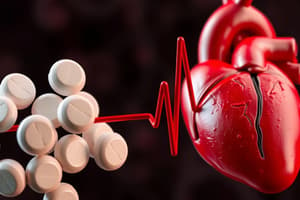Podcast
Questions and Answers
What is the mechanism of action of class IA antiarrhythmics?
What is the mechanism of action of class IA antiarrhythmics?
block fast Na+ channels decrease rate of phase 0 depolarization decrease contractility
Which drugs are class IA antiarrhythmics?
Which drugs are class IA antiarrhythmics?
procainamide quinidine disopyramide moricizine
What is the mechanism of action of class IB drugs?
What is the mechanism of action of class IB drugs?
minimally block fast sodium (Na+) channels shorten repolarization in late phase 2 shorten the duration of action potential and refractory period
Which drugs are class IB antiarrhythmics?
Which drugs are class IB antiarrhythmics?
Class IB drugs are used for ___________ arrhythmias?
Class IB drugs are used for ___________ arrhythmias?
Is class IC first line treatment?
Is class IC first line treatment?
What is the mechanism of action of class IC antiarrhythmic drugs?
What is the mechanism of action of class IC antiarrhythmic drugs?
Which drugs are class IC antiarrhythmics?
Which drugs are class IC antiarrhythmics?
The class II drugs are ________________.
The class II drugs are ________________.
What is the MOA of class II antiarrhythmics?
What is the MOA of class II antiarrhythmics?
Which drugs are class II antiarrhythmics?
Which drugs are class II antiarrhythmics?
Which drugs are class III antiarrhythmics?
Which drugs are class III antiarrhythmics?
What is the MOA of class III drugs?
What is the MOA of class III drugs?
What are characteristics of amiodarone, and which receptors & channels does it block?
What are characteristics of amiodarone, and which receptors & channels does it block?
Which drugs are class IV?
Which drugs are class IV?
What is the MOA of class IV antiarrhythmics?
What is the MOA of class IV antiarrhythmics?
What phase of the nodal action potential does digitalis work to slow HR?
What phase of the nodal action potential does digitalis work to slow HR?
Which phase of the nodal action potential do calcium channel blockers work to slow the HR?
Which phase of the nodal action potential do calcium channel blockers work to slow the HR?
What phase dose lidocaine and phenytoin work on to control ventricular arrhythmias?
What phase dose lidocaine and phenytoin work on to control ventricular arrhythmias?
What phase of the ventricular action potential do CCBs work?
What phase of the ventricular action potential do CCBs work?
What happens to phase 2 (plateau) when there is hypocalcemia?
What happens to phase 2 (plateau) when there is hypocalcemia?
What happens to phase 2 (plateau) when there is hypercalcemia?
What happens to phase 2 (plateau) when there is hypercalcemia?
Flashcards are hidden until you start studying




